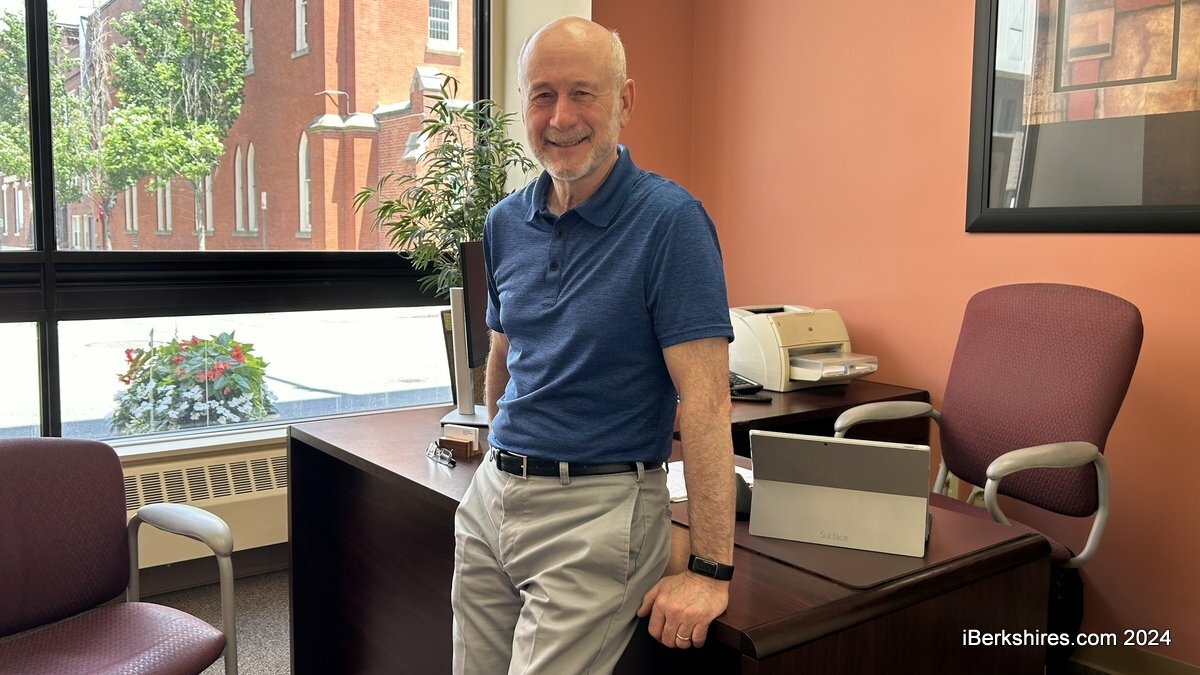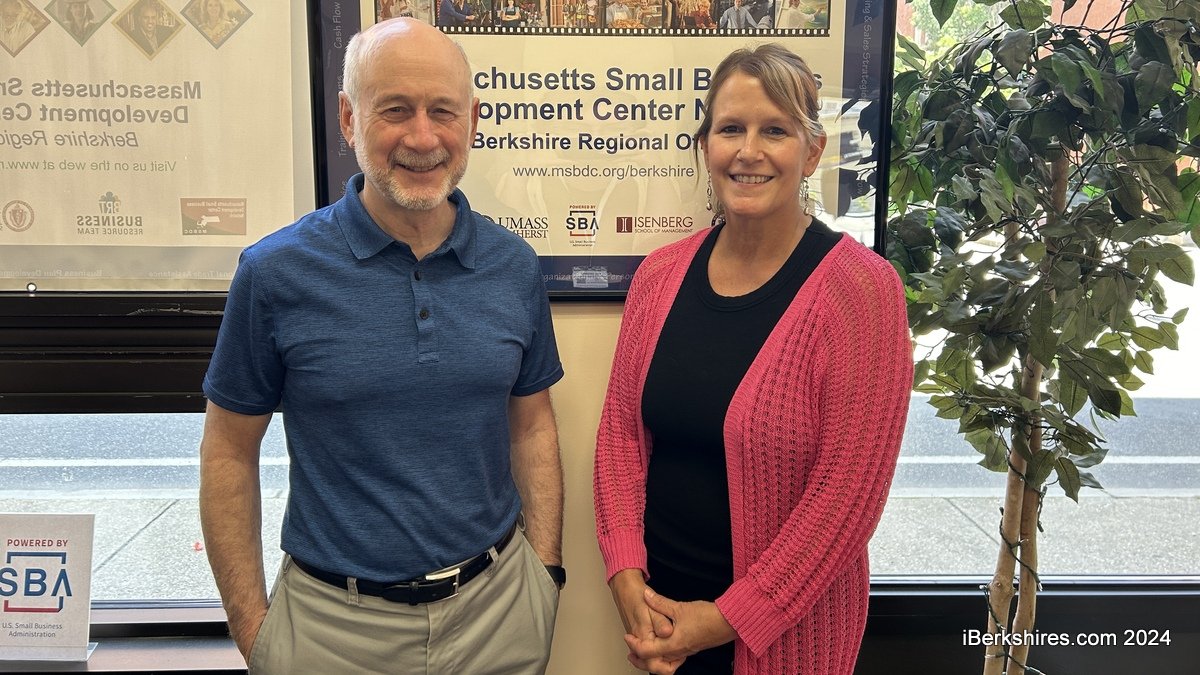
Q&A: Keith Girouard Reflects on Tenure, Small Business Landscape

PITTSFIELD, Mass. — Keith Girouard, longtime regional director of the Massachusetts Small Business Development Center, has announced his retirement at the end of this month.
Girouard joined the organization in December 2007 as a senior business adviser and became director of the Berkshire regional office in 2009. He has worked with more than 1,765 businesses and entrepreneurs, held 8,780 business advising sessions, and offered 12,660 business advising hours.
While he will miss being a witness to success and the many interpersonal connections he made, retirement is more of a reset.
"I'm still going to have and lead and want a vital life, I'm going to be active and dynamic. I'll even work in a different capacity," he said. "So it's not really retiring. For me, it's like a reset. A reset of things and an opportunity for me to infuse more creativity."
With a passion and love for small business, Girouard sees himself as continuing to be involved in the sector.
"I was working in with small businesses before this job in a couple of different capacities so I imagine in the future, I'd be working with small businesses but we'll see what happens," he said.
"I don't want to lose the opportunity and the interest in sometimes taking leaps, taking risks."
He has three pieces of advice for those looking to open a small business and for his successor: Hard work, good choices, and great advice.
Girouard has also taught workshops and business development classes, led business events with the U.S. Small Business Administration and numerous state and local organizations, and published articles on creative venturing.
He was named a Massachusetts star performer at a national convention of America's Small Business Development Centers and helped the Berkshire Center achieve the U.S. Small Business Administration's designation as a Center for Excellence and Innovation.
What led you to your decision to retire?
"It's not what one would expect, it's a mixed bag," Girouard said.
"I've done this for 16 1/2 years. I love it, lots of parts of it, but I have this sort of itch for adventure and I feel like I have another one or two big adventures in me. As we grow older, we sometimes like the security, the familiarity, and the sameness and there are great benefits to that, there's nothing wrong with that but for me, I realized that I wanted to expand and explore and that meant that I had to let some things go."
There is sadness with that because he enjoys the work, his colleagues, and watching entrepreneurs succeed.
"I get to be a witness and hopefully, hopefully, a contributor to the many successes," he said.
Some of Girouard's future adventures include hiking, as he would like to complete his venture across the Appalachian Trail that began in 1977 with more than 2,000 miles in three and a half months.
"The Long Trail, which was about 270 miles, it's taken me 45 years and I still haven't completed it," he said. "I still have about 70 more miles ago so part of it is I'd like to finish that."
He is also considering his body of experience and how it can be leveraged into another outlet. He has written and published articles on the nine principles of creative venturing and would like to complete a book on the art and science of possibility and creating and managing in a world of measurement.
What stands out to you as your greatest accomplishments over the last 16 1/2 years?
For Girouard, there are many and they are largely tied to others' success.
"I'm just amazed and very grateful that people have invited us in to be a witness," he said. "Obviously they're looking for assistance in technical support, which is what we provide, but it's been an amazing opportunity for me and for others to be able to have that role."
For him, being there to witness people turning their aspirations into a profession is "where the action is." He and Program Coordinator Jayne Bellora pride themselves in the humanistic aspect of the work.
"You have people's hopes and dreams converging with their deeds and desires to make a living," Girouard said.
"Plus, you have money and everything that money represents, and the risk that's associated, I mean, that's a pretty interesting platform for stuff to happen."
He emphasized that businesses don't make decisions, people do.
"So understanding the people aspect. The other part that I really enjoyed and felt satisfied with is acting as a change agent, helping people make the change that they want."
What is your take on the small business landscape of North Street?
Girouard applauded the move toward maximizing housing on the corridor. There are a variety of apartment rentals above the street-level storefronts and a nearly $18 million redevelopment of the former Jim's House of Shoes and Wright Building properties on the horizon.
He also appreciates Downtown Pittsfield Inc.'s decision to move its offices onto North Street, where it settled in last month.
"I think the movement towards housing is a smart movement, it's good for North Street," he said.
He has been a proponent of second-floor businesses since the Ruberto administration.
"Sometimes the emphasis is always on the first floor, the retail, and that's important but the second floor is where you get a lot of value added. That's where you get the office workers going for lunch and going shopping, you get the activity on," he said,
"And you always want the movement towards opportunities that don't rely on daily transactions because that can rise or fall depending on foot traffic. So if you have businesses that are on the second floor that are not relying on daily transactions that's kind of a nice mix."
Girouard feels that this is where North Street is headed.
"If people love your city, if you love your city, good things are going to happen. Great things, actually, so I think that's happening," he said,
"I've been around enough to have seen the rippling effect of when (General Electric) left the terrible disruption that that created and the difficulties that people had in terms of adapting and changing and the business community adapting, changing. I think we've gotten past that now."
What is one of the biggest trends that you saw in small businesses coming out of the pandemic?
"I think there are whole segments of the business population that stepped back and re-evaluated what they wanted to do, how they want to do it. Some were highly encouraged, maybe forced to do that. Others took the opportunity," Girouard said.
"We saw an acceleration and probably continued acceleration to online behavior, people purchasing online and looking got the hyper convenience of that so there's that part of it."
The market analysis and market opportunities were other aspects that shifted and changed, he explained, such as people looking for more online financing opportunities rather than traditional banking outlets and the emergence of crowdfunding.
"Likewise, business support systems are shifting and changing," he said. "Just simple things like bookkeeping, there are many more different ways in which to approach that."
With these evolutions, there will be some market opportunities and some market closings, he added.
How has the Berkshire SBDC adapted to COVID? What changes have there been internally as a result of the pandemic?
The organization now does lot more remote work, as many have, and clients have embraced it.
"We find that our clients, for the most part, want to do video conferencing or telephone conferencing, versus in-person stuff, although there are still people that want to," Girouard explained.
Trainings have also gravitated toward remote meetings and "We have become much more diligent around metrics and then in demonstrating performance in certain ways," he said.
While virtual work is more effective and efficient, he feels that there can be something gained through in-person communication.
"I hear more and more and I, myself, feel is there is something gained in the in-person connections," he explained. "As a trained facilitator and communicator you're picking up a lot of things in a three-dimensional sphere, versus a two dimensional."
What will you miss?
"What will I miss dearly is the work and the individual work that we do, that I did with people, and to see the change, and in the satisfaction of that," Girouard said.
"I will miss that dearly."
Tags: Q&A, retirement,















